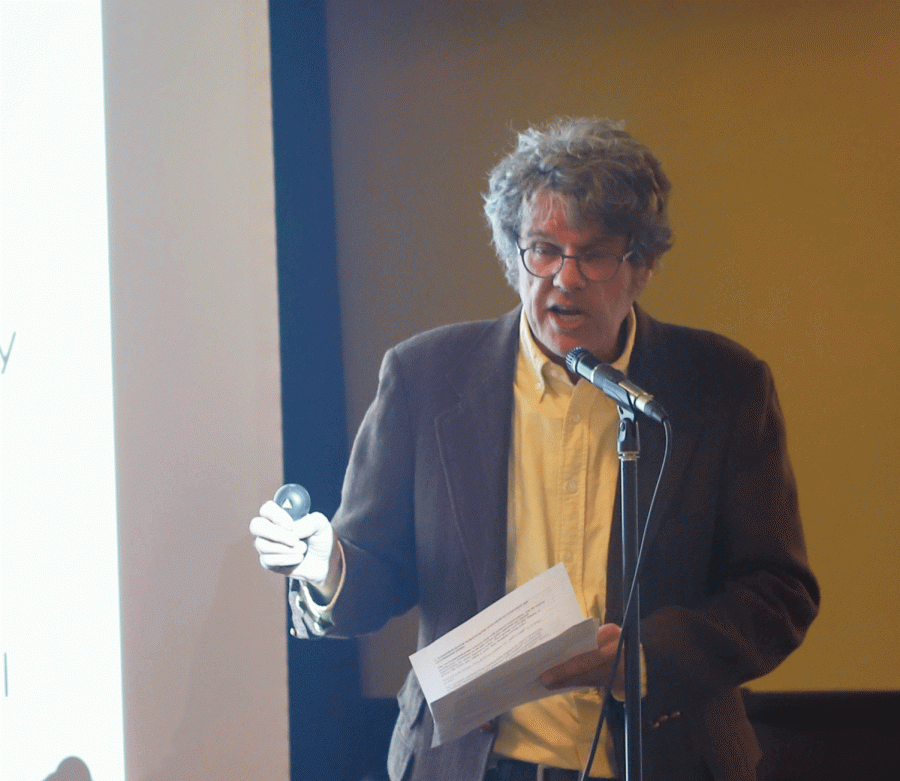From Golden Era to Gridlock: Klyza and the ENST Department Call for New Climate Change Policy
Visiting Professor Christopher McGrory Klyza (above) informs students about climate change politics and policies. ENST will be hosting events like this over the course of the semester.
On Friday, February 2, the Department of Environmental Studies (ENST) hosted a casual talk in Donovan’s Pub titled U.S. Climate Policy Pathways in a Time of Gridlock. This event is the first of nine events hosted by the department over the course of the semester.
Professor of Public Policy, Political Science and Environmental Studies at Middlebury College Christopher McGrory Klyza led the talk. The event was different from the typical style lecture in that it was split up into three parts. The first was a 20 minute lecture by Klyza, followed by a question and answer session with Klyza and Colgate Professor Environmental Studies Andy Pattison. The event concluded with a question-and-answer between Klyza and the audience.
Klyza gave an overview of climate change politics and policies since 2000. Since the 1990s there has been a gridlock in environmental policies in Congress over disagreements on climate change. There was a “golden era” of environmental political reforms from 1964 to 1980, where “remarkable bipartisanship” happened within Congress.
During these years, over 20 major laws were passed by Congress. Klyza claimed that after the 1980s the two parties mostly stopped working together and the gap widened over opinions regarding the reality of climate change. This made it nearly impossible to pass laws concerning the environmental protection.
Klyza claimed the most significant politician of his generation was Ronald Reagan because he changed attitudes about climate change. Reagan was not anti-environment; rather, he was anti-big government. He did not want to protect against climate change if that meant more government involvement in private affairs, and many Republicans followed his lead. Klyza believes this attitude is still held by many Americans today. Although most Americans agree that climate change is real and an impending danger, many lawmakers don’t see the threat as imminent and therefore discourage the allocation of government funding towards matters related to climate change.
Given the gridlock in Congress, Klyza highlighted different pathways that environmentalists can take in order to move forward.
Short of federal-level legislation, individual states can act at the local level.Twenty-nine states have already established that a certain percentage of their energy will come from renewable sources by a certain year. For example, California declared that 50 percent of their energy will come from renewable sources by 2030.
State courts are yet another means environmentalists have employed. There have been several cases where courts have ruled in favor of protecting the environment. In the 2007 case of Massachusetts vs. the EPA, Massachusetts sued the Environmental Protection Agency claiming that under the Green Air Act, the EPA must regulate greenhouse gases. The court decided that the EPA was required to regulate these gases under the law.
The next pathway Klyza discussed was executive politics, where the president can decide which initiatives to follow through on. During President Obama’s term, many policies were created. However, Klyza feels that the Trump campaign is now trying to roll back some of these policies.
The last pathway is collaboration in civil society. If Congress will not pass policies due to gridlock, Klyza emphasized that we must do our own part to protect the environment. Colgate has already committed to being greener, and so have other schools, cities, and businesses.
Klyza’s final point was that even though there has not been progress in passing national climate change laws recently, that does not mean there hasn’t been movement; it has just been through other pathways.
Contact Zoe Frishberg at [email protected].







